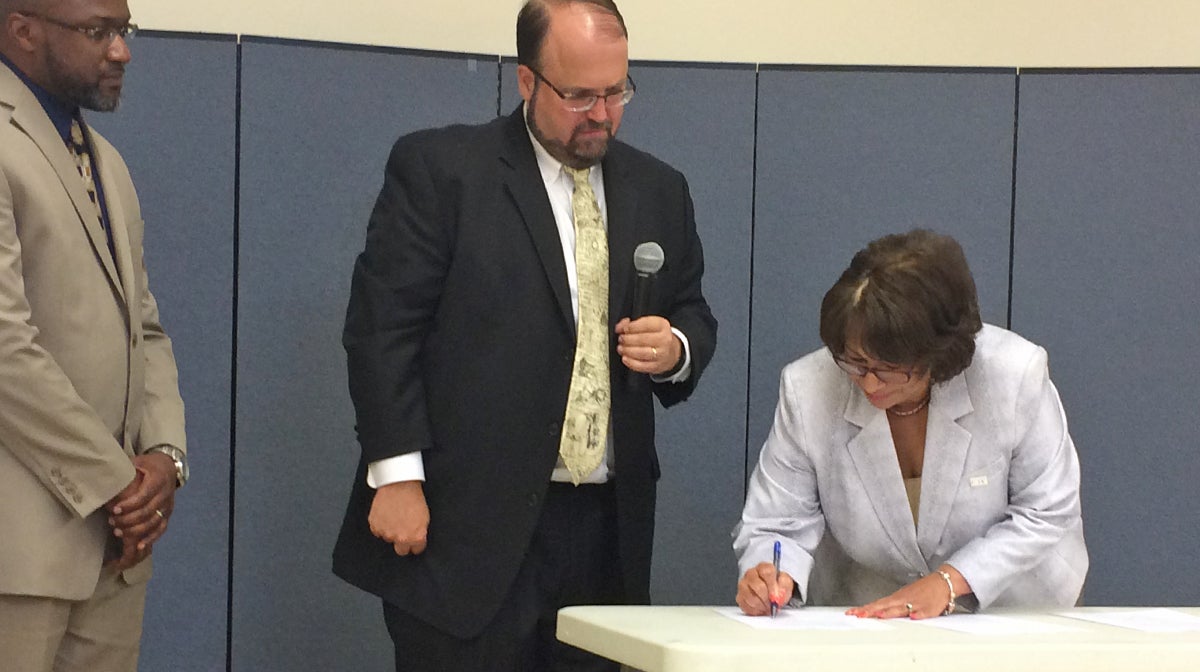Harrisburg ramping up lead testing, remediation efforts

Harrisburg Mayor Eric Papenfuse (center) and Hamilton Health CEO Jeannine Peterson sign a memorandum of understanding for the new lead testing and abatement partnership. (Emily Previti/WITF)
Peers in other cities admired Harrisburg’s new initiative, calling it unique and ambitious.
Lead-based paint remains in homes in cities nationwide, including many in Pennsylvania, despite long-standing awareness of health risks to young children.
So Hamilton Health Center, located in one of Harrisburg’s most distressed neighborhoods, already does free lead-exposure screenings for children under six.
But a new partnership with the city will mean new equipment for the center to facilitate faster testing and response.
Instead of waiting weeks, parents will get results within minutes. They’ll also answer questions and fill out paperwork with health workers to start the process of lead paint remediation, which the city does free for qualifying families (with a household income 80 percent or less than the city’s $34,000 median).
Mayor Eric Papenfuse says the need is great.
“Thousands of homes, 90 percent of all buildings in Harrisburg have lead paint, so you can deduce from that it’s more than [what] we’ll be able to do with this grant,” Papenfuse said Wednesday after announcing the program.
He’s talking about $3.7 million for the city’s remediation program from the federal Department of Housing and Urban Development. Most cities get this funding on a regular basis.
But the most recent round for Harrisburg includes money to hire someone to coordinate between the city’s lead abatement program and the health center, and the new equipment for the facility, which is located in one of the city’s most troubled areas.
The center’s doing screenings and remediation referrals during routine office visits and will also offer it at community events.
Papenfuse wants to test “all children” under the age of six in the city and hit 200 residential units by the end of 2018, about 30 percent more than usual.
They also referenced research linking lead exposure to brain damage, behavioral problems and violent crime.
That hasn’t been studied specifically in Harrisburg, though, where more than 12 percent of children tested — mid-range among Pennsylvania cities — had elevated levels of lead in their blood, according to the CDC.
Papenfuse described the program as unique nationally.
Pa. Department of Health spokesman Wes Culph says the department’s experts haven’t heard of anything like it.
But HUD spokeswoman Shante Goodloe says while Harrisburg’s program “stands out”, it’s not the only one of its kind.
It is similar to one in Long Beach, Calif., for example. There, physicians automatically report blood tests showing elevated lead levels to the city and officials then do a home visit to assess remediation possibilities, according to Nelson Kerr, manager of the city’s environmental health bureau.
But to directors of comparable programs in other cities, Harrisburg’s program sounded unusual (in a good way). “Ambitious,” even, in the words of New Haven, Conn., Environmental Health Director Paul Kowalski.
Privacy concerns often discourage similar ideas that would’ve relied on sharing medical information, according to program representatives in Huntington Park, Calif.
Papenfuse says those concerns already were ironed out for Harrisburg’s program as it’s structured now. But they’d have to be revisited if officials want to expand it in the future to entail, for example, testing students while in school.
WHYY is your source for fact-based, in-depth journalism and information. As a nonprofit organization, we rely on financial support from readers like you. Please give today.



